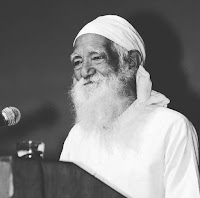Raju Korti
The ultimate test of man's conscience may be his willingness to sacrifice something today for future generations whose words of thanks will not be heard. Very few people I have been occasioned to meet have stood true to this dictum as Sunderlal Bahuguna has. He was to trees what oxygen is to the humans. I consider it a milepost to have spent one full day in his company way back in 1981 when his hands were full; passionately defending the natives of Himalayas, working for temperance and the country's rivers that were beginning to become a bone of contention between the riparian states.
Then, enlightened that Green was a word that described a committed environmentalist, my knowledge about environmental sciences didn't travel much beyond the elementary fundamentals learnt in school. One chance meeting with Bahuguna changed all that. As one inspired by Gandhi, he trekked through the rugged terrains of Himalayan forests and hills covering almost 5000 kms and had a first-hand account of the damage caused by mega development projects on the fragile ecosystem of the intimidating and awe-inspiring mountain range and the subsequent degradation of social life in its rural hinterland.
Dressed in white pyjamas, white kurta with a bandana that looked partly soiled and his hair unkempt, I looked bemused at the tall, lanky man -- two front buttons open -- who I had seen moving partly bare even during the chilliest of climes of Garhwal. All of that actually didn't matter because what floored me was the benign smile on his jovial face. Before I could say anything, he gestured me to sit and proceeded to rustle up quite simply the best rustic salad I have ever been treated to. I watched as he poured soaked moong dal, finely chopped cucumber, tomatoes and squeezed a lemon with a pinch of salt and pepper. Giving it a quick, practiced mix, he offered the bowl to me. The taste still tickles my palate after 40 years.
Having pioneered the sui generis Chipko Movement that appealed to people to hug trees to save them from devastation, Bahuguna was at that time in the thick of mobilizing public opinion on Tehri dam protests that he championed for decades. As I wondered how he could undertake long fasts given his lean frame, Bahuguna explained to me the time-tested Gandhian means of holding satyagrahas and hunger strikes on the ecological impacts on the dam. Never once did he mention how first Prime Minister Narasimha Rao and then Deve Gowda dilly dallied on the issue and the protracted legal battle in the Supreme Court where the case was heard. Bahuguna took that loss in his stride with the same smile that had me drawn to him.
The Chipko Movement had started in early 1974 when trees were being indiscriminately cut by unscrupulous forest contractors in Uttar Pradesh but beyond this obvious environmental conservationist activism what stood out was his accompanying slogan 'Ecology is permanent economy.' It caught the attention of then Prime Minister Indira Gandhi who was so impressed with his advocacy that she imposed a ban on cutting green trees for 15 years. I could see this was just a Pyrrhic victory for his battered soul as the ban remained mostly in breach than practice. But then he was never the one to keep grudges. His protests were as simple and unassuming as his own self.
Speaking in measured words and tone, he demystified almost every environmental issue under the Sun - dams and their seismic hazards, depleting ozone layers. Greenhouse gases, climate change et al, all the stats at his tongue tip. "There is a simple way to know if the ecological conditions around you are good. If you can hear the croak of a frog in the monsoon and sparrows chirping around you, it means the ecology is hale and hearty. Birds are the indicators of Environment. If they are in trouble, we will be in trouble sooner." His spiel was laced with examples and figures and it was astounding that an individual could be a repository of such wealth of knowledge. It belied his peasant-like appearance
In his free-flowing style, he explained how intricately human lives were intertwined with forests, rivers and the wilderness. "As a peaceful activist, my sights weren't riveted on ecological issues alone. I could see the menace of alcoholism in the hills and how imperative it was to empower the Dalits, especially women, who were denied entry in Tehri district's temples."
His convictions were reasoned with a mix of impeccable English, Garhwali phrases and grassroots wisdom. I believe he was perhaps the only activist who was gentle, quietly persuasive and yet strongly rooted in his beliefs. The occasional anger was quickly left behind and replaced by his infectious smile. The country's homegrown environmentalist stood in stark contrast to the post-industrial activists of the genre that abound in the West. To be able to trigger concern for environment across urban India with such tireless application is unheard of in my experience.
It is an irony of sorts that this Man of Earth is lost to us for the very reason he was so vocal about. As he told me that day with that child-like smile: "The Earth does not belong to us. We belong to the Earth."





No comments:
Post a Comment